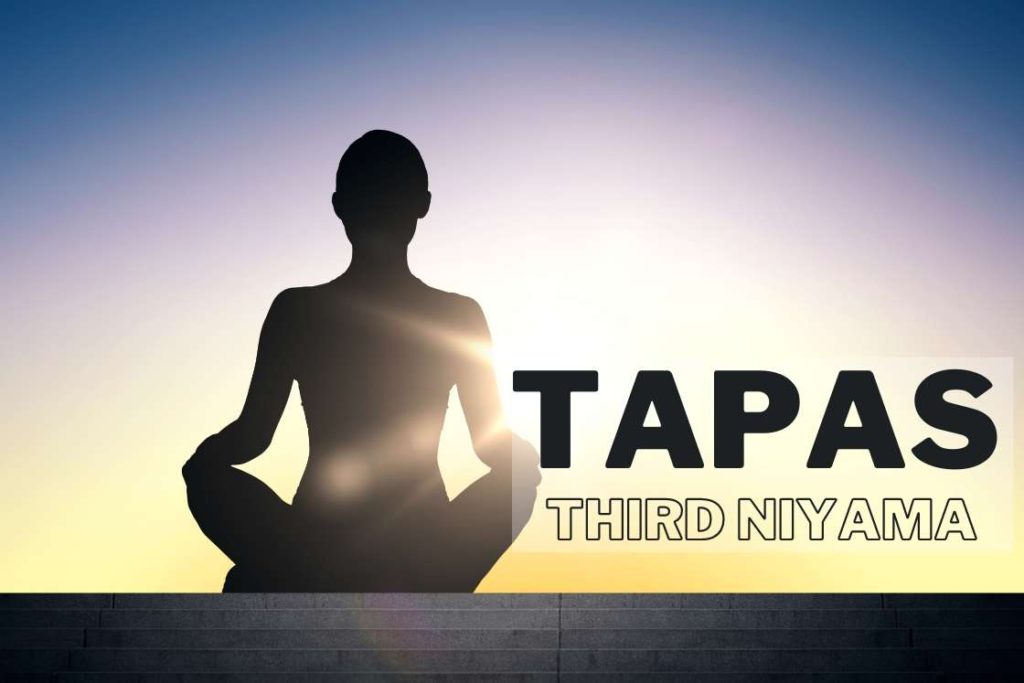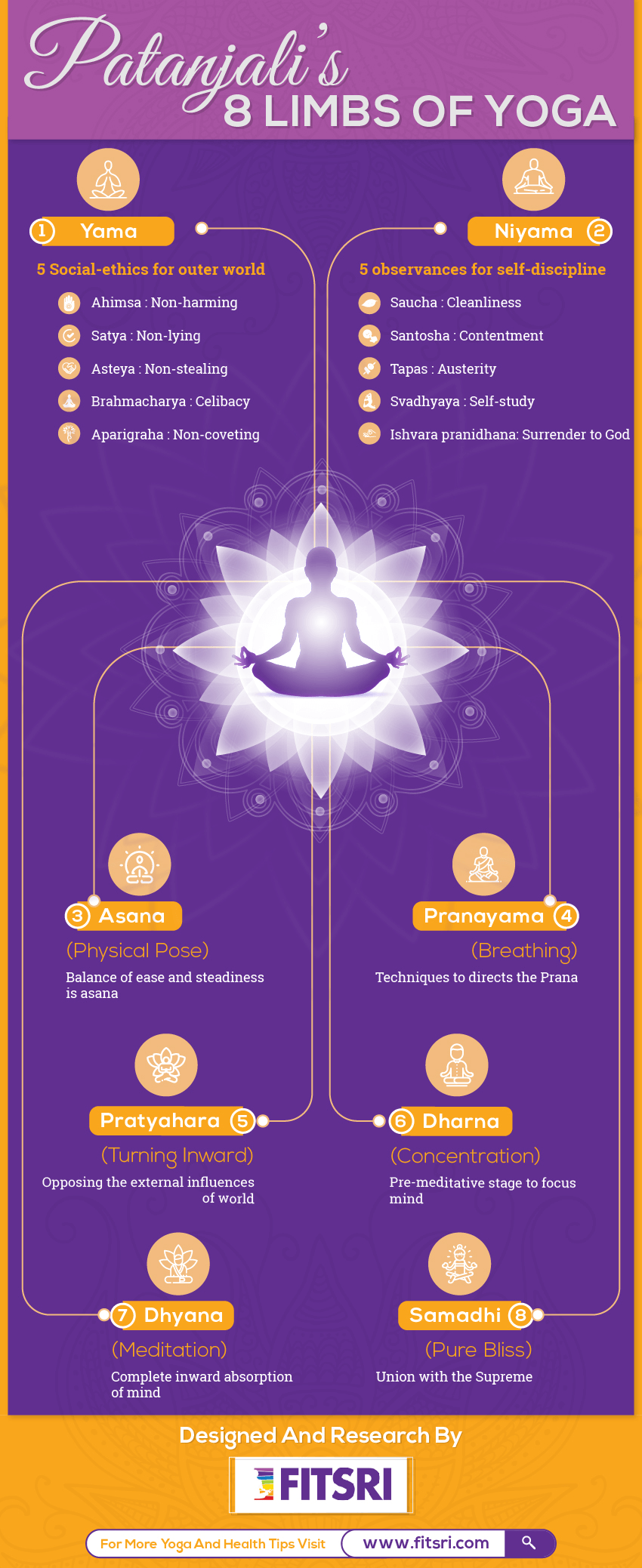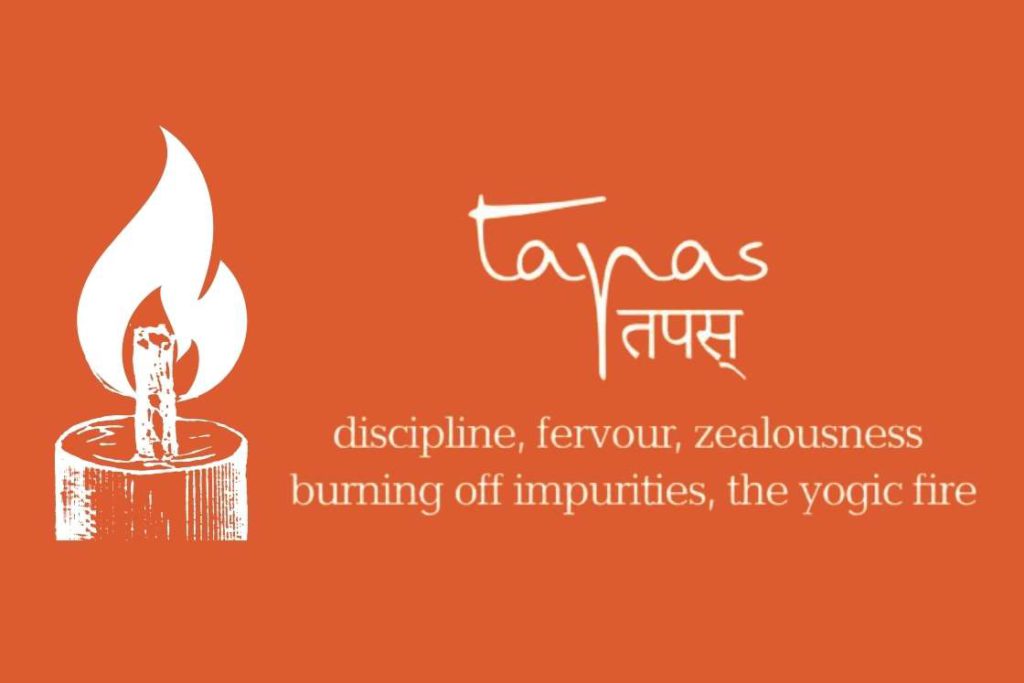
The reason why many of us can dream of brilliant realities but fail to materialize it, is because we lack Tapas. The 21st century is ripe with almost all the known evils like greed, gluttony, laziness, and such. A major reason behind all corrupt affairs of current times. Tapas is the solution to break free of these fundamental evils.
Tapas in its literal sense means austerity and self-discipline. It is the link between your will and action. An important concept to understand before delving deep into the topic is that Tapas is subtly different from other Yamas and Niyamas.
Tapas is the result of an action
Other Yamas and Niyamas (of which Tapas is just small practice) are direct actions. The acts themselves are the virtues. Let’s evaluate kindness for example, which is a form of Ahimsa (non-violence), the first of Yamas. When a person donates something, the act of donation itself is called an act of Kindness.
For Tapas, however, it’s entirely different. Tapas is never the act itself, neither is it the quality of the act. It’s in fact the result of the act. Let’s understand this with the example of self-discipline, which is one interpretation for the word Tapas.
You wake up every morning at 6 A.M to learn self-discipline. We never say waking up early is an act of Self-discipline. In fact, there is no such thing as an act of self-discipline. What we call it is a self-disciplining act; meaning an act that teaches you self-discipline.
This understanding stands true, even if you look at the literal translation of the word Tapas, which is “Heat”. There is no such act which is termed as heat. Rather you perform different activities that generate heat. In the sense of Tapas, running is an activity that generates physical Tapas. So the act of running is not heat, but the act of running generates heat.
The Third Niyama
In yoga, the concept of Tapas however can be incorporated with any physical or mental practice like physical postures or meditation but its root lies in the eight limbs system of Ashtanga yoga.
Tapas is an integral part of Ashtanga yoga which is based on Patanjali’s eight limbs system. In the order of 8 limbs, Tapas is the 3rd part of the 2nd limb of yoga, called Niyama.

According to Patanjali’s concept of Ashtanga yoga, 5 Niyamas gives a list of practices that prepares the base of yogi’s lifestyle. And Tapas in this list is “a means for perfection of the body and the organs through the lessening of impurities”, says Benjamin R. Smith, in his book “Yoga in the Modern World: Contemporary Perspectives”.
The 5 Niyamas are.
- Shaucha (cleanliness)
- Santosha (Contentment)
- Tapas (Discipline, austerity or ‘burning enthusiasm)
- Svadhyaya (Study of the self and of the texts)
- Isvara Pranidhana (Surrender to a higher being)
It’s interesting to see the last three of Niayamas i.e. “Tapas, Svadhyaya, and Isvara Pranidhana” combinedly make the base of Kriya yoga. A kriya is called to that action that frees us from the “bondage of karma” by burning physical and mental impurities. Through tapas, we transcend our limitations in pursuit of self-realization. Then by practicing Svadhyaya we turn our consciousness inward to the self, self-inquiry. Then once we realize a glimpse of our inner self, the practice of Ishwara Pranidhana connects the individual self to the universal self. This highest experience itself is called Samadhi.
The meaning of Tapas

There are several meanings of Tapas in the context of yoga including self-discipline, meditation, simple and austere living, or any means of inner self-purification.
The literal meaning of the word Tapas is heat, however, in practical life, it speaks of our inner heat; the burning enthusiasm. Physically speaking, heat is generated from friction or resistance. In Tapas we use our physical and mental conditioning to push against the natural resistance our body and mind offers, this resistance is said to generate the inner fire.
The Tapas, since related to heat, is considered to have a purifying effect, which can be a preparatory step for practicing postures and meditation. In a contemporary sense, the vigorous workout routines with physical and psychological benefits, practiced by all professional athletes and sportsmen, can be considered Tapas.
For example, when you are running, you are continuously pushing many physical and mental boundaries, and you will quite literally generate heat within your body. This is a very good tangible example of Tapas. Tapas will also make biological changes, like an increase in your blood flow, heart rate, metabolism, and hormonal activities.
However, Tapas is not restricted to just the physical workout-related implications. A stern observance of lifestyle routine, diet, and physical and mental habits are all considered as different types of Tapas. Do note that practicing Tapas, doesn’t naturally make you an ethical and moral individual. A great many tyrants in history are known to be stern practitioners of Tapas. Tapas empowers you with the physical and mental condition, suitable to achieve greatness. The ethical and moral values will depend on how ardently you follow the 5 Yamas.
Types of Tapas
The previous section must have given you an idea that Tapas is of more than one type. The types of Tapas are mainly divided depending on the intention or the 3 gunas of the specific practitioner. The first type, and the most harmless type, is the Sattvic Tapas. The second one is the Rajasic Tapas, which has a strong materialistic aspect to it. And finally, the third one and the most unethical one is the Tamasic Tapas.
1. Sattvic Tapas
Sattvic Tapas is possible only when you strictly follow the ideals of Yama. In Sattvic Tapas, you do not aspire or want anything in particular. The only aspiration you have is of unity with the sole essence of all creation. And Tapas can help you prepare for that unity. In sattvic Tapas enhancing physical and mental well-being is the final aspiration, there is no ulterior motive to it.
2. Rajasic Tapas
Rajasic Tapas, unlike many of its interpretations, isn’t all bad. In case of Rajasic Tapas there is always an ulterior motive. One who practices Rajasic Tapas, wants his physical and mental upgrades to achieve something in particular. It can be something nasty, but can also be something for the greater good. For someone who wants great mental and physical abilities to help the betterment of civilization, it’s quite a commendable aspiration. In such a case Rajasic Tapas can be non-harming.
3. Tamasic Tapas
Tamasic Tapas is never an ideal version of Tapas. The foundation of this type is built on inflicting self-harm. Tamasic Tapas is when an individual pushes his mind and body to perform activities that can harm you. And this harm is intended as a form of self-punishment. A disturbing example is self-inflicting tortures as self-punishment, practiced by some religious cults.
Tapas in religious context

Before discussing the religious context let’s clear out a very basic confusion. The confusion between religion and mythology. Tapas is a concept that is heavily scattered across ancient religious texts and mythological texts that often interrelate. Note that religion is a compilation of ancient beliefs, protocols, and practices, that collectively preach the best ways to live harmoniously. Mythology on the other hand are narratives, often used in religious texts, to emphasize on a particular (or a group of) virtue. Understand that the virtue itself is the religion, and the story used to emphasize the virtue is Mythology.
Hindu literature contains many examples of individuals who became extremely powerful through Tapas and then wield their power with malicious intentions. Now you can take this information with a pinch of salt, and let’s not ponder upon the factuality of the religious literature. But what we can emphasize on is that even in ancient and medieval times, Tapas or Austerity was a tool to achieve great mind-body abilities. Which some people used for their personal gain, and neglected the social destruction it caused.
Ancient people understanding the power of Tapas, realized the need to abide by the practice with a strict moral compass. Which is why, the sacred text of Hinduism, Bhagavad Gita uses the religiously revered Lord Shri Krishna to explain Tapas, morally. In Bhagavad Gita, Tapas is categorized into three forms, Tapas of Mind, body, and speech.
1. Tapas of Body includes cleanliness, non-violence and sexual fidelity.
According to Bhagavad Gita, the Tapas of the body is when you put your body in service of goodness and humanity. And by stating body, it includes all your senses. Sexual fidelity is also considered in this form of Tapas. Tapas of the body is to be followed with cleanliness and a non-violent approach.
2. Tapas of Speech includes truthfulness, compassion, and beneficial words.
Tapas of speech is simply speaking words that are true, non-hurtful towards others, and promote well-being. The best way to explain the Tapas of speech is through Manu’s words, “Speak the truth in such a way that it is pleasing to others. Do not speak the truth in a manner injurious to others. Never speak untruthful, though it may be unpleasant. This is the eternal path of morality and dharma.”
3. Tapas of Mind includes silence, self-restraint and gentleness.
Lord Shri Krishna stated in Bhagavad Gita, “Elevate yourself through the power of your mind and not degrade yourself, for the mind can be the friend and also the enemy of self.” The human mind is capable of great deeds. And thus, the Tapas of Mind is the most important of all. Self-restraint, willpower, dedication, determination, and loyalty, are all results of Tapas of mind. Infact, since our mind controls our actions and words, to practice Tapas of body and speech, you will primarily need Tapas of mind.
An essential Prerequisite of Tapas

Tapping into the inner fire is no easy task. Our body and mind have naturally evolved to give into temptations and distractions of mind and senses. To push against these natural inclinations will take a true test of character. To practice Tapas one must realize his or her true sense of purpose. A true or meaningful sense of purpose is something that will motivate you constantly. This is why Tapas is a character generally possessed by ambition-driven people.
If you are someone who just wants to breathe for the sake of breathing, eat for the sake of eating and live for the sake of living. Alas! Tapas will forever elude you. However, if you have a burning enthusiasm to achieve something, it can be anything, a revolutionary idea, or a dynamic social change, you will have an abundance of motivation.
The sense of purpose varies from person to person. Someone extremely materialistic will probably have a revolutionary wealth-generating idea. Someone philanthropic will aim to eradicate a social evil. Whilst, a nature lover could pick up the cause of sustainability. Remember, a purpose is something always greater than yourself, something that affects creation at a greater scale.
So, what about someone lacking a sense of purpose? S/he too can practice Tapas, but consistently practicing the holistic nature of it, will be difficult. S/he can explore different aspects of Tapas, practice it and even improve life quality in general. But the miraculous world-changing effects of Tapas may be out of reach.
How to practice Tapas?

Like it has been discussed throughout the article, Tapas is a comprehensive concept. And you do not practice Tapas directly. But you practice different physical and mental activities, that will give your body, speech, and mind, the quality of Tapas.
1. Early to bed, early to rise
Waking up early is a very basic yogic principle, and is something we have all heard from our parents while growing up. But as we grow up, waking up early becomes increasingly difficult. The ideal time to wake up is at 5 A.M. which very few of us follow. Draw up a new routine that includes you waking up at 5 A.M. and going to bed not later than 11 P.M. This will be difficult at first, but once you learn to consistently wake up early, you will master one of the most difficult aspects of physical Tapas.
2. Eat like a Yogis does
A yogi doesn’t indulge in gluttony. A yogi doesn’t eat to delight, but to survive and intake the necessary nutrients. For us (non-yogis), however, eating is equivalent to feasting. And it’s not only in the sense of flavor but in quantity as well. Such a diet is not only inconsiderate of the others but also unhealthy. Eating a watchful diet, will keep your mind and body fit, and rid of all toxins. A yogic diet will condition your mind and body, to perform at practical best.
3. Bring the heat of Tapas to the mat
Introducing Tapas on the mat is definitely a worthy consideration. Add a little difficulty to your yoga routine. Do not promptly reach for supports and modifications. Let your body and mind withstand a little turmoil. Gradually increase the duration of static holds in each pose. You will feel pain but resist the urge to give up. Naturally, this will build up mental and physical resilience. However, you must be careful with the extent to which you push. There is a very thin line between Tapas and injury, try not to cross it. Forms of yoga-like hot yoga and rocket yoga are good ways to introduce Tapas on the mat.
4. Observe silence, when words are not needed
We, humans, are highly opinionated, and naturally, we have an opinion about everything we see around us. People who lack Tapas, tend to always express their opinion in words, irrespective of the sentiments of others. To attain Tapas, try to develop the habit of not speaking unnecessarily. Observe everything around you, analyze and process what you observe. But try to absolve the need to pass a verbal remark.
5. Include routine meditation
Routine meditation is almost quintessential for conditioning your mind. The best way to attain Tamas of mind is through meditation. Your mind will initially distract from all possible thoughts, but try and focus. Being patient with your meditation will in itself improve your Tapas. In the beginning, you will probably meditate for a few minutes, with only a few seconds of successful concentration. Maybe not even that, but do not give. Next day repeat the attempt, only this time increase the duration.
At the beginning you will probably feel disgusted with yourself for failing to concentrate, but do not give up. Continue this process of failing to concentrate till you eventually succeed. Succeeding at meditation will prove one of the biggest steps to mental Tapas.
6. Abide yourself with routine
Following a routine develops a tough mental conditioning. A mental conditioning that will help you increase your commitment levels. Have a structured and timed routine for everything you do, the time you wake up, the time you sleep and the time you eat. Have a routine for your work, your leisure and even your exercise.
7. Include proper rest throughout the day
Rest is very important for your physical and mental well-being and conditioning. However, rest doesn’t mean just sleeping. It is also the way you manage your workload throughout the day. Even when having a busy schedule, pace out your work throughout the day.
Ensure not to cross your threshold of exhaustion at any point. Include eye exercises and relaxing muscle stretches in between work. Indulge in occasional relaxation therapies. And culture hobbies, that will help you vent out your mental exhaustion.
8. Introduce Self-Penance to stay on track
You don’t have to beat yourself up for every mistake you commit. However, you must have a system in place that will remind you not to commit a mistake, yet not cause you any harm. Take for example every time you fail to meet a deadline, skip a leisure activity from your routine and replace it with a relaxing meditation.
9. Never stray from the habit of studying
The ideal reason to have Tapas is to attain the liberation of mind. And in order to liberate your mind you need knowledge. And as we know, knowledge is endless; you can never have enough of it. In order to give a direction to your Tapas and realize your deep sense of purpose, you must regularly study. Study different subjects, science, math, art, social sciences, literature, history, ancient scriptures, economics and so on. An educated mind is the richest treasure chest there ever will be.
10. Reflect on your actions before going to bed
Throughout our day we commit more mistakes and sins than we realize, but are we ever held accountable for it? No definitely not, unless it’s something illegal. A small lie, a passing hurtful comment, afternoons sulking into laziness, or a fleeting moment of jealousy; our days are filled with such trivial sins.
All these sins, over time, build up and impact our overall behavior and personality. Thus to correct the larger picture, you must change the tiny strokes of error. Before going to sleep every night, reflect and introspect on every little action of yours. You don’t have to do anything, just single out the virtue-less deeds of the day, in your memory, and ponder, what you could have done differently.




